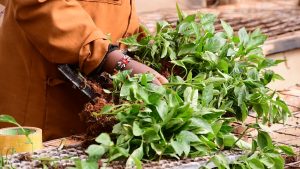In the heart of Murang’a County, a few kilometres from Kenol Town, lies an award-winning agro-based company known for producing fruits, vegetables, herbs, and tree seedlings through soil-less propagation.
Started in 2019 by Lamech Victorious and his wife, Loise Kabuti, both in their late twenties, Mkulima Mdogo Seedlings Limited today supplies millions of seedlings to farmers across the country and beyond, a testament that incorporating technology in farming is the ultimate game changer.
Lamech specialised in the construction industry at the university while his wife, a graduate in electrical engineering, manages the empire that has over 60 youthful men and women working as full-time employees. Numerous others depend on the empire indirectly.
KNA visited the farm one hot afternoon, and we found the farm a beehive of activities, from thousands of seedlings being prepared for shipping to workers watering millions of tiny, lush green seedlings on planting trays in the greenhouses to a team of agronomists checking and testing this and that.
We settled down for the interview that was punctuated with intermittent breaks as Kabuti’s phone could not stop buzzing as clients made orders and enquiries.
“We started producing seedlings way before 2019 at our grandfathers’ farm in Kangema through the traditional type of growing seedlings—nursery beds,” she says, adding that “we later set up the farm here on a ¾-acre piece of land and transitioned to propagation using the planting trays and soilless media greenhouse setup.”
Through the soilless technology, they have been able to produce quality seedlings that are well-hardened with a 100 per cent survival rate.
Unlike the traditional seedbed, where germination percentage is low due to direct sunlight, this new technology produces a germination rate of over 80 per cent because they are able to use the overwater and underwater irrigation techniques.

“Initially we would only produce up to 5000 seedlings in a week, but now we can comfortably produce more than 200,000 seedlings per week and meet the ever-rising demand.
The agripreneurs would also face the challenge of the low survival rate of the seedlings grown on the nursery beds because during transplanting, the roots face the risk of being destroyed, unlike the soilless media that grows the plants using coco peat.
“We clean the coco peat media first before any planting takes place, and this ensures it is free from pathogens, and it surpasses the traditional soil in water retention and aeration and has fibre, thus ensuring the survival of the seedlings and good returns, “notes Kabuti.
The farm’s social media presence has drawn clients from across the country and beyond.
“Our largest clientele is from Matuu, Garissa, Namanga, Mombasa, Tanariver, Meru, Kubu, Mwea, and even Zambia,” she says, silencing her buzzing phone for the umpteenth time.
On prices, leafy vegetables like kales, terere, manage, and spinach go for sh 2-5 per seedling depending on the variety, while the fruit-bearing type like eggplant and capsicum go for sh. 5 to 20 per seedling; others like the tree seedling, like the dragon fruit and mulberries, range from sh. 50 to sh. 1000 per seedling.
They also propagate seedlings for farmers as long as they are quality hybrid seedlings so as to maintain the farm’s credibility and ensure the farmers get a return on investment.
“This venture is, however, not without challenges, the main one being that farming depends on seasons and climate change, and when we experience long seasons of drought, orders go down because most of our farmers rely on rainfall.”
Numerous hours spent researching and learning have enabled mkulima mdogo proprietors to sustain their empire and cut a niche for themselves in the world of agribusiness.
Kibuti urges farmers to explore new ideas, new technologies, and new energies to breathe life into their farming and to ensure they produce quality products, as this will give them referrals and thus run profitable agribusinesses.
“Carry out soil tests before embarking on any project on your farm, as this will show what is required and what nutrients are missing in the soil, and be patient, as it takes time to get the fruits of any labour.”
By Florence Kinyua










